Overcoming Impostor Syndrome in IT
Today I want to talk about something different: something nontechnical and not specific to network automation, but in the end just as important to us in IT, in Networking, and as Network Automation Engineers. I would argue that it is even more important than anything technical I could possibly write about. Today I want to talk about Impostor Syndrome, the thoughts and feelings associated with it, and how it affects me and so many of us personally and professionally.
I Bet I Know You
Odds are I’ve never met you before, but if I were a betting man, I’d wager I know you pretty well. Let me take a guess.
Like me, you’re an impostor. You work hard every day, but live on the edge of your seat, ready to be found out by your boss or your peers. You have no idea why you are as successful as you are. It’s a fluke. It’s luck. It’s a mistake. It doesn’t matter what you’ve accomplished, as it’s only a matter of time until you are found out as the impostor you really are. You don’t know how you got to your current position in your company or (perceived) level of expertise, but it definitely is not because you are qualified. It’s because you have managed to somehow trick every single person along the way into thinking you are competent. But only you know and can see the truth. It’s all a lie. You’re an impostor.
If we’re being honest here, I’d bet I am pretty accurate with most of you reading this. In fact, I’d love it if you commented below how accurate I am. When I first read a description similar to this, I was floored with how closely I could relate to it.
My Personal Journey
I’ve been in the networking world since 2007, and really got into scripting and automation around 2016-2017. But as I’ve progressed in my career, my struggle with impostor syndrome has only increased, not decreased; which is strange, because one would think it would be the opposite.
It doesn’t make any sense! I’ve been involved in Networking for over fifteen years, and have grown in my technical skills, accomplishments, seniority, knowledge, and experience. So why do I feel like more of an impostor than I did five years ago? Why did I not feel like an impostor back in 2007, first entering into IT? When I first started out, I was young, fresh, and eager to learn. Those traits are still there, the fear of failing and being an impostor wasn’t there initially. It has grown and developed over time. Why is that?
In order to answer this question further, as well as to understand and overcome my own impostor syndrome, I started digging into this about a year ago. What I’ve learned has helped me immensely, has already helped other people with whom I’ve discussed this, and now I’m hoping it will help everyone who reads this.
Note: One of my main resources I used to understand impostor syndrome came from the book The Imposter Cure by Dr. Jessamy Hibberd. It was a very helpful resource for me, and throughout this blog post, I will be referencing things I’ve learned from this book. I encourage you to read it as well.
Understanding Impostor Syndrome
Before we can fix any problem, technical or otherwise, we must first understand it. Think about it. How can anyone troubleshoot a routing loop without first having a fundamental knowledge of what networking is, what routing is, or even the OSI model? The same goes with Impostor Syndrome.
I’ll start us off with a great quote from Ted Lasso, the star in one of my favorite TV shows.

What Is Impostor Syndrome?
My definition of Impostor Syndrome is:
- The feeling of being a fraud.
- The feeling that you are not as good as other people perceive you to be.
- The feeling that you are not worthy of the success you have currently attained.
- The feeling that it’s only a matter of time until other people realize what you’ve known all along.
Impostor Syndrome is all about feelings, not necessarily facts. If you noticed in my summary definition, the root feeling in all of these is fear. In fact, we can rewrite the above bullet points more accurately:
- The fear of being a fraud, and perceived as such by others.
- The fear of not being as good as others think, and living up to their expectations.
- The fear of losing all of the success you’ve accomplished as soon as you stop being able to hide your impostor self.
- The fear that other people will see through you.
What Triggers These Feelings?
While we impostor tend to have those thoughts and feelings on a regular basis, there are times when these thoughts and feelings are more pronounced than others.
Most impostors tend to be people pleasers, so events that happen that influence other people’s perception of you can really bring on this feeling of being an impostor. Notice I didn’t say “influence negatively,” because even positive events can trigger this. For example, have you succeeded at a project recently or accomplished something big at work, and maybe even received recognition for it? How did you feel?
If you’re like me, you think things like “They didn’t notice all the mistakes I made,” or “I could have done better,” or maybe even “How am I going to keep up this level of work?” My personal (least) favorite one I tell myself is “I can never replicate this level of success again.”
Other big triggers of Impostor Syndrome are during times of transition. This can include times when we get a promotion, or get a new job, or even just start a new project in our current role. Times of transition are fraught with change and uncertainty, which, understandably though not correctly, increase feelings of anxiety, insecurity, and self-doubt.
Changing jobs or roles can also cause feelings of insecurity around your current level of knowledge and/or skills. Think of it like this. Do you remember when you started at your current job? If it’s been less than a year, think back to your most recent job you held for over a year.
How did you feel? Did you know anything at all? Did you break something? I have, many times! Big, important things that I did, not because I was incompetent or incapable of learning, but because I was new. However, I’ll save those stories for another blog post.
Yet I look back after working somewhere for over a year and I am so much more confident and comfortable in my role and in my daily job. A place I literally could never have imagined getting to in my first three to six months at a new company. Yet I still felt like an impostor when starting out, even knowing I was new, and knowing everyone else knew I was new, and that all of the struggles of learning a new job are fully expected.
In the same breath, I’ve never been overly critical of any new hire, nor have I seen others be. I expect them to ask questions, to take longer to solve a problem, and to not know how to log into anything. In fact, if they don’t ask questions, they may even come across negatively as too confident or not open to learning and adapting to the role.
The Impostor Cycle
In Dr. Hibberd’s book The Imposter Cure, she describes a negative reinforcement cycle of Impostor Syndrome before proposing an alternative way of looking at it.
Negative Reinforcement Cycle
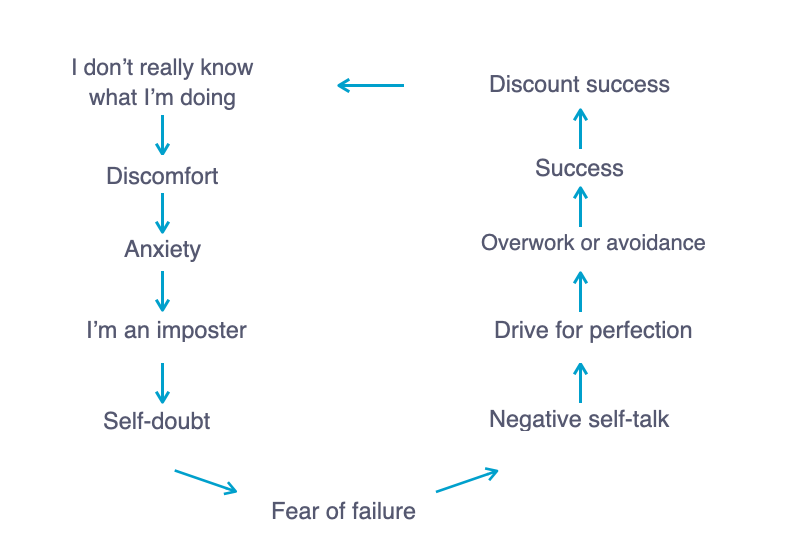
We can see here how most feelings that start with the impostor idea of “I don’t know what I’m doing” lead to discomfort, anxiety, and feelings of being an impostor. These in turn push us towards saying or thinking negative things about ourselves, and an unhealthy drive for an unattainable perfection that only exists in our minds. These then lead to either overworking ourselves, avoiding work altogether, or sometimes both!
Even when we do encounter success, we discount it for any number of reasons. She lists out some common ones. I can personally relate to most of them at some point or other in my life. How about you? Do any of these sound familiar?
- I got lucky
- It was a fluke
- I’m a good actor
- It was nothing
- I had a lot of help
- I just worked really hard
- If I can do it anyone can
- They’ve made a mistake
- They felt sorry for me
- I was in the right place at the right time
- No one else wanted to do it
- It’s only a matter of time before I’m found out
Breaking Out of the Impostor Cycle
One of the main topics Dr. Hibberd discusses is that the cycle begins with a feeling. The feeling of discomfort, anxiety, self-doubt, and that you don’t know what you’re doing.
Feelings are not facts.
Feelings are only just that: feelings. They may seem like facts when they come from within, but they are absolutely not facts. Once we can recognize this, we can start to rewrite this cycle into a more positive one, enabling us to break out of the impostor syndrome cycle.
Positive Reinforcement Cycle
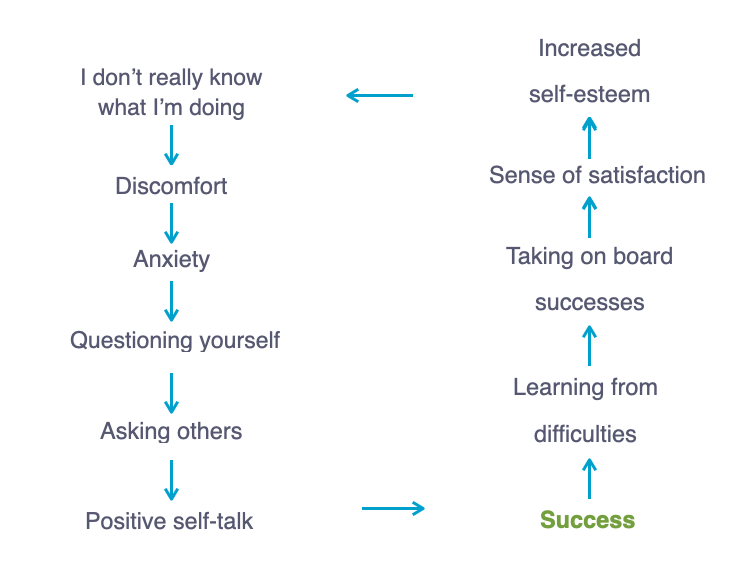
We see here that she keeps the feelings of not knowing what we’re doing, discomfort, and anxiety. These are completely normal feelings for anyone in a new or difficult situation. But we need to recognize these feelings for what they are: feelings, not facts. Once we do, we can question these feelings a little further. Are they really grounded in truth? Or are they simply a by-product of my discomfort and anxiety?
One of the things that helped me the most when working on my own impostor syndrome was to talk to my peers about it. No, seriously! The best antidote to shame and anxiety and feelings of inadequacy is to “bring it out into the light,” or talk about it with others.
This was extremely hard at first, but got easier the more I did it. To my surprise, nearly everyone I brought this up to felt similarly and had no idea that others felt the same way too.
Impostor syndrome lives and grows in darkness and isolation. The more we realize we are not alone, the less of a stranglehold it has on us.
I strongly encourage you to do the same. If you like, or maybe just feel more comfortable in doing so, I welcome you to contact me directly. I can be reached by my handle @mattv on Network to Code’s public Slack org, or by email at matt.vitale@networktocode.com.
Identifying Impostor Syndrome
There are many characteristics you may be familiar with as an impostor, but there are three I personally feel strongly most of the time. They are Confirmation Bias, Overworking, and Avoidance.
Confirmation Bias
Confirmation Bias is essentially seeking out and/or favoring information that already supports our existing expectations and beliefs. We are so certain that we are right in being an impostor, and everyone else around us is wrong, that no amount of evidence otherwise could possibly be true.
We reject any positive information as untrue, either through explaining why it’s wrong, pointing out minor mistakes instead of bigger successes, or just flat out rejecting it.
However, negative information of any type, size, or validity is welcome. We grab hold of it, hold on for dear life, and use it to reinforce our already existing belief that we are, in fact, an impostor. To an impostor like me, even the most minor amount of constructive criticism can be devastating. This is where that comes from.
Once again, Dr. Hibberd does a great job identifying a “Confirmation Bias Cycle” in her book.
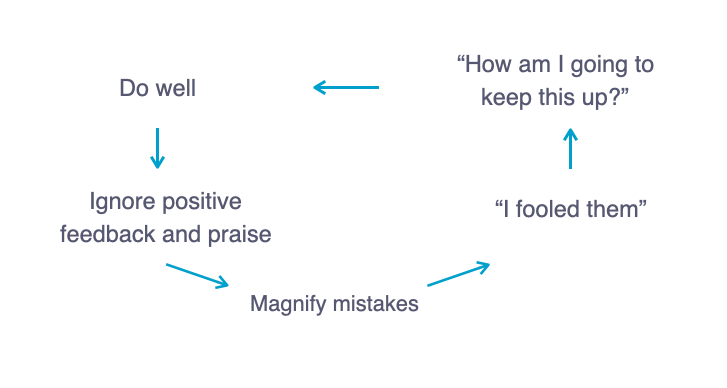
This cycle leads to the next two items: overworking and avoidance.
Overworking
When I feel like I’ve been given a task or project that I am not good enough to do, or not experienced enough in, I tend to compensate by overworking. I’ve worked 10+ hours straight, not because I had to, but because I felt like if I didn’t, the work wouldn’t get done correctly and everyone would see how bad I am at my job. The project would flop, I’d get fired, and down the rabbit hole I would go again with all of the negative “what if” scenarios.
In reality, I do a good job when I am at work. I work hard, try hard, and continuously work to better myself (e.g., reading The Imposter Cure). I learned that all overworking does is stress me out way more than it actually helps. It detracts from my very valuable time I have left in the day with my family, my hobbies, or just general self-care.
Avoidance
When I feel overwhelmed with a task, I avoid it. I used to think it was purely because I was lazy. Maybe back in high school, but it’s not the case anymore! Now it’s avoiding because of fear of the task itself, and not doing a good enough job at it.
I even caught myself doing it with this blog post. It was so subconscious, I didn’t realize it at first until I detached for a minute and really thought about it. I avoided starting to work on this blog post for over a month after committing to doing it to Jason Edelman, the literal founder and CTO of Network to Code, for fear of not living up to my own internalized expectations on the quality of this post. Thank you once again, impostor syndrome!
Overcoming Impostor Syndrome
I’ve spent a lot of time discussing Impostor Syndrome, what it is, and some of the ways I have recognized it within myself (and hopefully you can as well). As I mentioned before, I personally believe it’s as important to build a good foundation of what something is, and being able to recognize it when it does come up, before I can ever start to work on it.
So now let’s discuss some strategies around dealing with it, and eventually overcoming it. I have begun my journey of overcoming impostor syndrome, and you can as well! I’ll go over some of the ways that have worked for me that you may want to give a try.
I’ll start off with a great tweet from Adam Grant that I found very helpful.
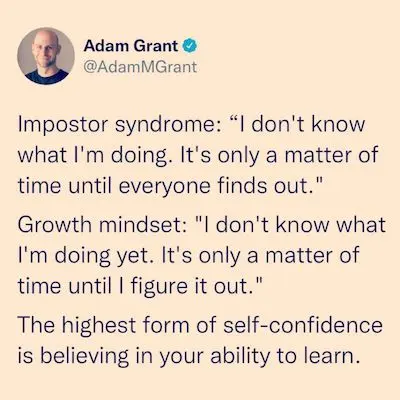
So let’s take his advice and start with believing in our own ability to learn about this nontechnical topic.
The Journey
You’ll notice I said “begun my journey” earlier, and not that I have overcome it. That’s because this process is a journey that takes time and effort to overcome, one step at a time. I still fall into the impostor syndrome trap on a regular basis. However, over time it has gotten easier to both identify it when it happens and occurs less frequently than it used to; and I am better able to leverage some of my strategies to deal with it.
Strategies
9 Ways to Cope with Imposter Syndrome
Lindsay Kolowich Cox wrote a great blog post titled “9 Ways to Deal With Imposter Syndrome Before It Hinders Your Success”. In it, she outlined nine great ways to cope with impostor syndrome. I’ll briefly go over some of them here, but her blog post is worth a read, as she goes into a lot more detail on these nine steps.
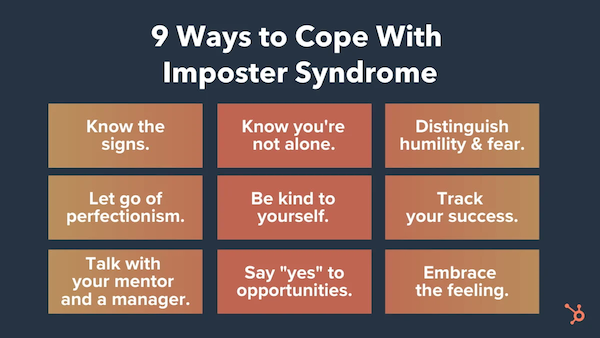
- Just knowing the signs of what impostor syndrome is can really help when it occurs, as we can recognize some of the negative feelings as being related to impostor syndrome, or some of the thoughts that come up in our head as well. When I realize I’m feeling or thinking that way, it’s easier for me to move from the negative to the positive impostor cycle I mentioned earlier.
- Knowing you’re not alone is so critical to overcoming this. One of the things that helped me the most when I first started at Network to Code was finding another new hire who felt similarly and sharing how we felt in a way that helped us both relate to each other.
- Distinguishing humility and fear is important. We can be humble and accept success without the fear of being a fraud that tends to come with it. Remember, fear is a feeling, and feelings are not facts.
- Letting go of perfectionism is definitely one of the hardest things for me to do, however just understanding that perfectionism is unhealthy and perfection is unattainable is itself a great start.
- Being kind to myself is completely opposite to the way my impostor self normally thinks but is also just as important of a step in quieting the impostor voice.
- Tracking your successes really helps you fight impostor syndrome, as it gives you a physical, tangible list of hard accomplishments that you have earned and achieved.Dr. Hibberd does a great job describing this in her book as gathering evidence for a trial, where you are the defendant and the impostor syndrome is the prosecution. It will come up with every negative thing it can think of as evidence for why you are an impostor. It is important for you to have your own physical “proof” to counter its claims and show that you really have accomplished things and earned your current level of success. We don’t want to keep these accomplishments just in our head. Simply the act of writing them down can psychologically trick our brains into making them more real, which is exactly what we want: to recognize them as real.
- Talking with your mentor or a manager is a great way to open up to someone you trust who is in a position to help you. I would be very surprised if they didn’t respond empathically and with similar stories from their past.
- Saying yes to opportunities, even when you don’t feel like you deserve them or are able to accomplish them, is hard at first, and you may even need to force yourself to do it. But know that it is the impostor that is holding you back, not your actual capabilities.
- Lastly, embracing the feeling for what it is, and accepting the fact that you feel it, is so critical. Your feeling is valid. It is normal. It is real. However, it does not mean it is a fact, and you have the right and responsibility to yourself to question negative feelings. It doesn’t mean they are always wrong either, but it does mean that upon closer inspection they may not be as real as they feel.
Criticism vs. Compassion
A strategy Dr. Hibberd discusses in her book is to learn criticism vs. compassion and to learn to recognize what the impostor voice sounds like in our own head. We must become aware of when it is the impostor voice inside of our head speaking vs. our regular self. The more I learn about what impostor syndrome sounds like, the easier it is for me to identify it.
For example, what words and tone am I saying to myself? Is it negative or positive? If it is negative, is it actually helping me at all? Lastly, is this something I would say to someone else’s face?
Once I am aware of when the impostor voice is speaking, I can work to silence it and find a new voice for myself. I replace the negative words with positive words I would normally say to someone else. I accept and acknowledge both my successes AND my mistakes, and acknowledge that mistakes are COMPLETELY NORMAL. Everyone makes mistakes—literally everyone. Therefore, it would be abnormal to go through life without ever making a mistake. We all know that just doesn’t happen!
I recognize now that I cannot be perfect (perfectionism), and I will make mistakes. But I also recognize that I do the best that I can, with the resources provided to me, at any given point in my life. For my entire IT career I can say this is true, so I now offer myself compassion instead of criticism whenever I make a mistake, no matter how big or small.
IT-Specific Strategies
I really struggle in IT whenever I start a new job, especially this one here at Network to Code where everyone is incredibly smart and talented in the field of network automation. For me, the first three to six months at a new job are a real struggle, but I’ve come up with some tips that have helped me and hopefully help you as well.
- Find an “easy-win” ticket or open issue to tackle. We work out of GitHub, and there are many projects where there are numerous issues with the label “good first issue”. These are very real issues that we may need to solve, however they may be minor yet time-consuming enough that other employees are already engrossed in projects and deadlines and may not have the time to work on them.Project issues with this label are really good for people new to the project to enable them to contribute, while also learning a lot about the project itself and how it works at a technical level.
- Documentation. Everyone loves it. Nobody wants to take the time to work on it. It’s one of those truisms of IT that seems to exist literally everywhere. However, working on documentation forces you to understand and learn about a topic in order to explain it well. Additionally, everyone loves updated documentation and appreciates documentation work. Most of the times I’ve worked on documentation for someone else’s project, I’ve gotten a DM from them personally thanking me for the effort.In doing this, you’ll have not only accomplished something, you will most likely have learned something, and you will have felt a sense of satisfaction from it. Doing this will help you integrate into your new role or project and help you feel more comfortable as you settle in.
- Ask questions. There have been so many times I have wanted to ask a question in a public Slack channel, and I’ve been too afraid to do so for fear of others perceiving me as incompetent. Granted, there are some times I have a “case of the Mondays” and ask questions I don’t really need to, but then again who hasn’t? I’ve learned to simply shrug those times off, and it gives me something good to laugh about later.
For the most part, the questions I ask actually help others who may reference them later without me ever knowing that they did. I know this because I do exactly this all the time!
I once asked “How do I delete device results in the Golden Config plugin?” in our internal Slack channel. One very smart and respected manager responded with “Just click the delete button.” As embarrassing as that was, I accepted that I was having a rough day that day, I acknowledged it in the channel by making a joke about it, and I moved on.
Instead of thinking “Everyone must think I’m an idiot” (criticism), I instead thought to myself “I must be starting to wear down mentally from troubleshooting a bug in my project all day. Now is a good time to take a break” (compassion and self-care).
Final Thoughts
I genuinely hope my sharing some of my experiences and what I’ve learned can help others with similar struggles. Impostor Syndrome in IT is a very real thing that is so rarely talked about. But only through talking about it, and not being afraid to talk about it, can we overcome it.
I mentioned this earlier, but if you feel comfortable doing so, I encourage you to leave a comment below or reach out to me directly. I can be reached by my handle @mattv on Network to Code’s public Slack org, or by email at matt.vitale@networktocode.com.
I’ll leave you with one final quote I found on Twitter by Jen Heemstra that I really liked.

Thanks for reading.
-Matt
Additional Resources
Here are some additional resources I’ve found helpful, and they have helped inspire this blog post.
The Imposter Cure – Book
How Do You Overcome Imposter Syndrome? – Blog
9 Ways to Deal With Imposter Syndrome Before It Hinders Your Success – Blog
Tags :
Contact Us to Learn More
Share details about yourself & someone from our team will reach out to you ASAP!
